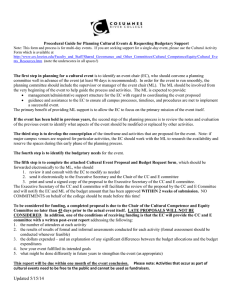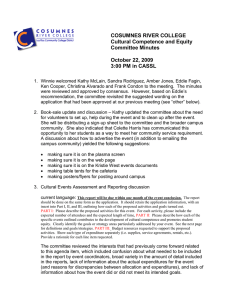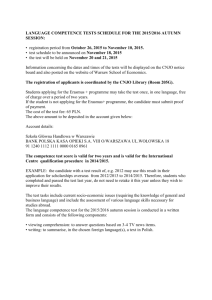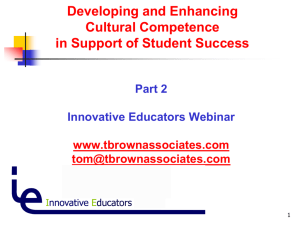Cultural Event Plan and Budget Request
advertisement
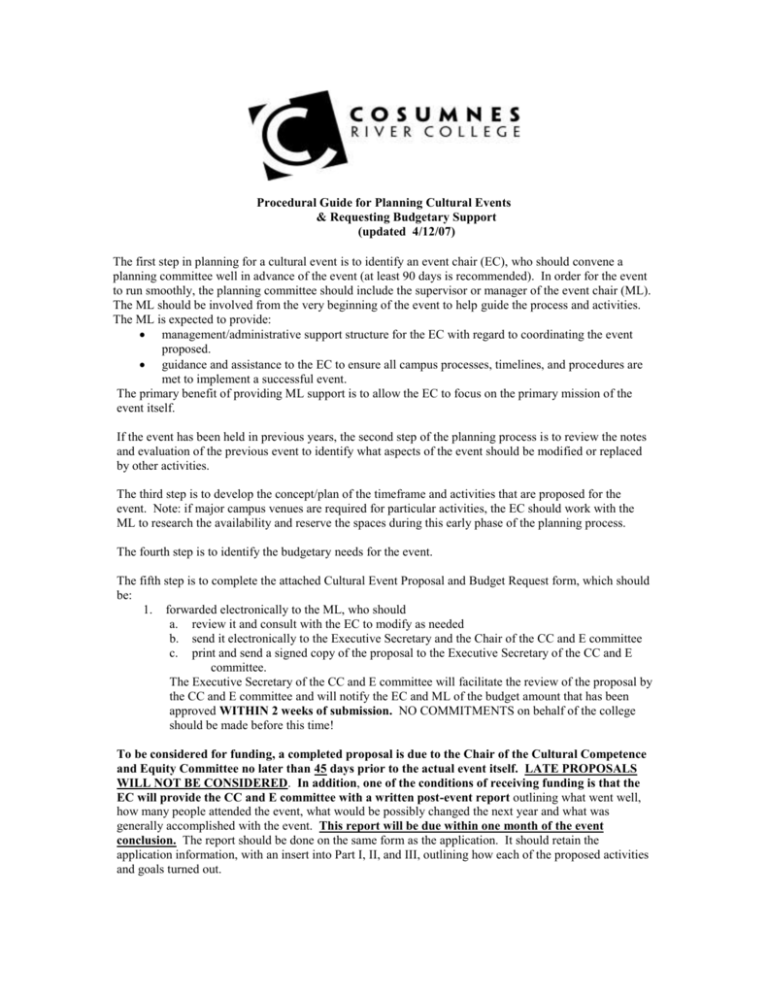
Procedural Guide for Planning Cultural Events & Requesting Budgetary Support (updated 4/12/07) The first step in planning for a cultural event is to identify an event chair (EC), who should convene a planning committee well in advance of the event (at least 90 days is recommended). In order for the event to run smoothly, the planning committee should include the supervisor or manager of the event chair (ML). The ML should be involved from the very beginning of the event to help guide the process and activities. The ML is expected to provide: management/administrative support structure for the EC with regard to coordinating the event proposed. guidance and assistance to the EC to ensure all campus processes, timelines, and procedures are met to implement a successful event. The primary benefit of providing ML support is to allow the EC to focus on the primary mission of the event itself. If the event has been held in previous years, the second step of the planning process is to review the notes and evaluation of the previous event to identify what aspects of the event should be modified or replaced by other activities. The third step is to develop the concept/plan of the timeframe and activities that are proposed for the event. Note: if major campus venues are required for particular activities, the EC should work with the ML to research the availability and reserve the spaces during this early phase of the planning process. The fourth step is to identify the budgetary needs for the event. The fifth step is to complete the attached Cultural Event Proposal and Budget Request form, which should be: 1. forwarded electronically to the ML, who should a. review it and consult with the EC to modify as needed b. send it electronically to the Executive Secretary and the Chair of the CC and E committee c. print and send a signed copy of the proposal to the Executive Secretary of the CC and E committee. The Executive Secretary of the CC and E committee will facilitate the review of the proposal by the CC and E committee and will notify the EC and ML of the budget amount that has been approved WITHIN 2 weeks of submission. NO COMMITMENTS on behalf of the college should be made before this time! To be considered for funding, a completed proposal is due to the Chair of the Cultural Competence and Equity Committee no later than 45 days prior to the actual event itself. LATE PROPOSALS WILL NOT BE CONSIDERED. In addition, one of the conditions of receiving funding is that the EC will provide the CC and E committee with a written post-event report outlining what went well, how many people attended the event, what would be possibly changed the next year and what was generally accomplished with the event. This report will be due within one month of the event conclusion. The report should be done on the same form as the application. It should retain the application information, with an insert into Part I, II, and III, outlining how each of the proposed activities and goals turned out. Cultural Event Proposal and Budget Request Name of Event: Date of Event: Name of Event Chair (EC): Name of Management Liaison (ML): ________________________________________________________________________ PART I: Please describe the proposed activities for this event. For each activity, please include the expected number of attendees and the expected length of time, Part II: Please describe how each of the specific events outlined contributes to the development of cultural competence and promotes student equity. Please identify the goals or strategy areas particularly addressed by your event. Please see the next page for definitions and goals/strategies. PART III: Budget resources requested to support the proposed activities. Show each type of expenditure separately (i.e. supplies, service agreements, rentals, etc.). Provide a rationale for each line item requested. Signature of EC:______________________________________________________________ Date:______ Signature of ML:______________________________________________________________ Date:______ ( signatures above attest to the completeness, accuracy and appropriateness of this proposal) CC and E Committee Approval:____________________________________ $ Date:_____ Definition of Cultural Competence Culture implies an integrated pattern of collective behavior, including habits, customs, values, beliefs, and institutions. Competence implies the capacity to function effectively. Cultural competence is the skill of interacting positively with all people - embracing their race, gender, class, religion, sexual orientation, age, culture, ability, or physical abilities. Cosumnes River College pursues values, attitudes, and practices that promote healthy, constructive interactions in a diverse community. Cultural competence is an ongoing process of institutional, professional and personal development through assessment and revision. To promote cultural competence and create a truly democratic learning environment, CRC values: 1. 2. 3. 4. 5. Diversity Continuous personal and professional assessment and revision Awareness of the dynamics of cross-cultural interactions The ongoing pursuit of teaching strategies and student services that better serve a diverse population An environment of inclusion, equality, and justice Definition of Student Equity (paraphrased): Student Equity is achieved, per Title V, when there are no significant differences in the success indicators of Access, Course Completion, ESL and Basic Skills Completion, Degree and Certificate Completion and Transfer rates between the following populations: American Indians, Alaskan natives, Asian and Pacific Islanders, Blacks, Hispanics, Whites, men, women and persons with disabilities. Student Equity Plan Goals GOAL 1.1: Develop a comprehensive and strategic outreach plan that targets underserved population. GOAL 1.2: Identify and address processes that inhibit student access to enrollment for both on-line and onground students. GOAL 2.1: Increase faculty understanding and implementation of culturally proficient teaching methodologies GOAL 2.2: Enhance campus climate for college employees. GOAL 3.1 Enhance support for ESL and Basic Skills students GOAL 4.1 Enhance Student Use of Academic Planning and Support Services GOAL 5.1: Increase opportunities for transfer students to make connections with other members of the campus community GOAL 5.2: Implement systems to facilitate the transfer process CC and E Strategic Plan Strategy Areas STRATEGY AREA 1. Design, conduct and implement a comprehensive staff development program which promotes personal development and enhanced ability to contribute to student success. STRATEGY AREA 2: Support the implementation and assessment of programs and teaching methodologies designed to enhance student success. STRATEGY AREA 3: Create a Campus Climate that Respects and Welcomes Diversity STRATEGY AREA 4: Create a campus structure to provide leadership and expertise to the cultural competence initiative Application Guidelines Cultural events eligible for funding from the CC and E committee are: campus based; designed to enhance cultural identity AND to enhance cultural competence of participants; include the following features: They include activities (such as speakers and/or films) that are explicitly designed to educate all attendees about historical or current issues that are relevant to a cultural or ethnic group; They are integrated with, and/or supported by, classroom activities so either provide students with the opportunity to showcase and share their knowledge with the broader campus or provide unique and powerful and unique learning opportunities for students. They may have activities that celebrate one or more aspect(s)of the group's history or identity that are designed to strengthen the cultural identity of attendees who are members of the group and to enhance cross cultural understanding among the attendees who are not members of the group. These should not be the major focus of the event. In general, there are some established limits and norms for various categories. If your application exceeds these amounts, significant explanation needs to be provided. These maximums or norms include: Advertising - $250 max Stipends/honorariums - $250 or $300 as a norm Food - $250 norm Supplies - $300 norm Budgetary max per event is approximately $2500. When evaluating and modifying requests, activities with a rich educational component that engage students and the campus are given preference as compared with activities that are more celebratory in nature.
